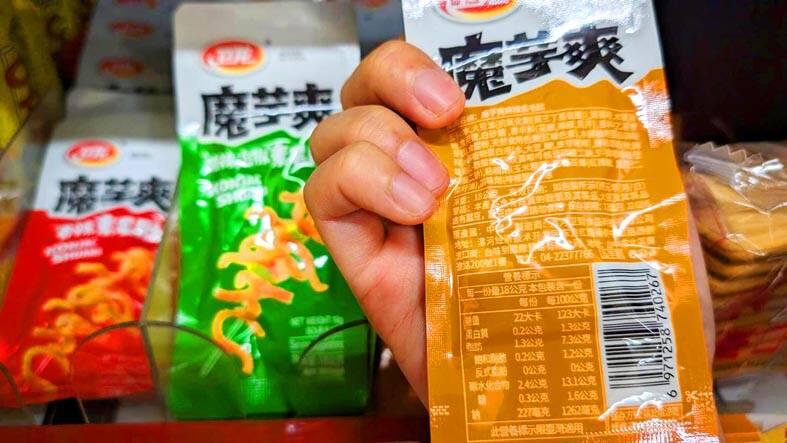The National Federation of Teachers’ Unions said children should be dissuaded from eating a spicy jelly-like snack from China that has become big hit among elementary-school students.
An elementary-school teacher recently wrote on Facebook that the savory “Konjac Shuang” snack from China contains extremely high levels of sodium and several additives, and that eating too much of it could adversely affect children’s health.
While some teachers are discouraging consumption of the snack, some students have taken to eating it secretly in the toilets, the teacher wrote, urging schools and parents to do more to stop students from eating it.

Photo: CNA
Konjac is a low-carb, high-fiber root vegetable often used to make a type of flour, and it is considered a health food.
However, clinic director Wang Chieh-li (王介立) wrote on Facebook that Konjac Shuang is a highly processed product that is high in fat and contains more than 1g of sodium for each 100g serving.
Federation president Hou Chun-liang (侯俊良) on Monday said that if teachers have nutrition and health concerns about some foods, they can explain their adverse health effects to students.
There is no need to worry if students occasionally try new snacks, but if they eat too much or the foods are harmful to their health, schools and teachers should take measures to restrict consumption, Hou said.
Yen Tzung-hai (顏宗海), an attending physician at Chang Gung Memorial Hospital’s Department of Nephrology, said the product’s 1g of sodium per 100g serving approaches the daily recommended limit for children.
The recommended daily sodium intake for children aged one to three is 1.2g, increasing to 1.5g for those aged four to eight, 1.8g for those aged nine to 13 and 2.3g for those aged 14 to 18, Yen said.
Ingesting too much sodium can lead to high blood pressure or cardiovascular disease, Yen said, adding that a small pack of Konjac Shuang contains more than 200mg of sodium.
Food and Drug Administration data showed that 515,483kg of Konjac Shuang was imported from China from Jan. 1 last year to Oct. 31.

EVA Airways today confirmed the death of a flight attendant on Saturday upon their return to Taiwan and said an internal investigation has been launched, as criticism mounted over a social media post accusing the airline of failing to offer sufficient employee protections. According to the post, the flight attendant complained of feeling sick on board a flight, but was unable to take sick leave or access medical care. The crew member allegedly did not receive assistance from the chief purser, who failed to heed their requests for medical attention or call an ambulance once the flight landed, the post said. As sick

A drunk woman was sexually assaulted inside a crowded concourse of Taipei Railway Station on Thursday last week before a foreign tourist notified police, leading to calls for better education on bystander intervention and review of security infrastructure. The man, surnamed Chiu (邱), was taken into custody on charges of sexual assault, taking advantage of the woman’s condition and public indecency. Police discovered that Chiu was a fugitive with prior convictions for vehicle theft. He has been taken into custody and is to complete his unserved six-month sentence, police said. On Thursday last week, Chiu was seen wearing a white

EVA Airways, one of the leading international carriers in Taiwan, yesterday said that it was investigating reports that a cabin crew manager had ignored the condition of a sick flight attendant, who died on Saturday. The airline made the statement in response to a post circulating on social media that said that the flight attendant on an outbound flight was feeling sick and notified the cabin crew manager. Although the flight attendant grew increasingly ill on the return flight, the manager did not contact Medlink — a system that connects the aircraft to doctors on the ground for treatment advice during medical

The Taichung District Court yesterday confirmed its final ruling that the marriage between teenage heir Lai (賴) and a man surnamed Hsia (夏) was legally invalid, preventing Hsia from inheriting Lai’s NT$500 million (US$16.37 million) estate. The court confirmed that Hsia chose not to appeal the civil judgement after the court handed down its ruling in June, making the decision final. In the June ruling, the court said that Lai, 18, and Hsia, 26, showed “no mutual admiration before the marriage” and that their interactions were “distant and unfamiliar.” The judge concluded that the couple lacked the “true intention of